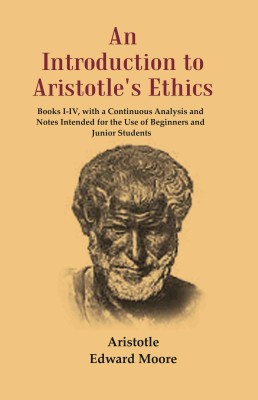An Introduction to Aristotle's Ethics: Books I-IV, with a Continuous Analysis and Notes Intended for the Use of Beginners and Junior Students(Paperback, Aristotle, Edward Moore)
Quick Overview
Product Price Comparison
About The Book: The same considerations must serve as an apology for language sometimes consciously loose and unphilosophical in the Analysis and Notes. The attempt to put such a treatise as that of Aristotle into such a ŌĆśmodernŌĆÖ light as may be intelligible to a reader ex hyp. Unacquainted with philosophical phraseology, seems necessarily to involve the sacrifice of technical accuracy. This desire to appeal as far as possible to modern sympathies has occasioned a certain amount of diffuseness in parallel quotations from recent popular writers. The best thanks of the author are due to several friends who have kindly assisted him by their advice in various parts of the work: and he will feel grateful for any further criticisms or suggestions that may be offered to him. About The Author: Aristotle, 384 B.C. - 322 B. C. Aristotle was born at Stagira, in Macedonia, in 384 B.C. At the age of 17, he went to Athens to study at Plato's Academy, where he remained for about 20 years, as a student and then as a teacher. When Plato died in 347 B.C., Aristotle moved to Assos, a city in Asia Minor, where a friend of his, Hermias, was ruler. After Hermias was captured and executed by the Persians in 345 B.C., Aristotle went to Pella, the Macedonian capital, where he became the tutor of the king's young son Alexander, later known as Alexander the Great. In 335, when Alexander became king, Aristotle returned to Athens and established his own school, the Lyceum Aristotle's works were lost in the West after the decline of Rome, but during the 9th Century A.D., Arab scholars introduced Aristotle, in Arabic translation, to the Islamic world. Edward Moore, FBA (1835ŌĆō1916) was an English scholar who specialized in Dante Alighieri. He was born at Cardiff, educated at Bromsgrove Grammar School and at Pembroke College, Oxford. For a time he was rector of Gatcombe, Isle of Wight. From 1862 to 1864 he was fellow and tutor of Queen's College, Oxford. In 1864 he became the principal of St. Edmund Hall, and in early 1903 he was made canon of Canterbury Cathedral. He became an honorary fellow of Pembroke and Queen's colleges (1902), and received the honorary degree D.Litt. from the University of Dublin.


